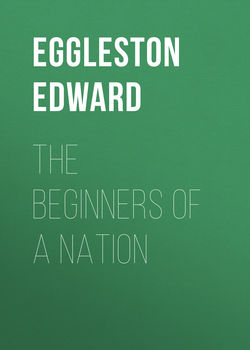Читать книгу The Beginners of a Nation - Eggleston Edward - Страница 35
BOOK I.
RISE OF THE FIRST ENGLISH COLONY
CHAPTER THE THIRD.
THE PROCESSION OF MOTIVES
VII
ОглавлениеRise of the patriot party in the Virginia Company. Dale's empty-handed return, and Argall's homecoming with hands full of the spoil of both colony and colonists, were severe blows to the hope of profit from Virginia, and thereafter commercial motives fell to a second place. The company began to pass more and more out of the control of traders like Sir Thomas Smyth and Alderman Johnson, and the corrupt clique of predatory merchants, as well as out of the reach of voracious noblemen like Warwick. More and more it passed into the hands of the great liberal statesmen whose leader was the incorruptible Sir Edwin Sandys, a man of rare gifts and knowledge and of great resoluteness. These men had suffered some disappointment, no doubt, in their struggle for parliamentary freedom in England. They might have succeeded better had their antagonist been a strong king, but against the pusillanimity, the vanity, the vacillation, and the pedantic dogmatism of James little permanent headway could be made. Without relinquishing the conflict in the House of Commons, they took it up in the Quarter Courts of the Virginia Company. In this new field they found themselves afresh confronted by the obstinacy of the king, who was stirred up to oppose them by the discarded governor, Sir Thomas Smyth, and his friends, by Warwick, and by all the partisans of high prerogative and all the advocates of the Spanish match. Woodnoth's Short Collection, p. 6. "Bedchamber men" and others about the king's person were engaged to work upon the king to come to the rescue of Sir Thomas Smyth's "honor." Peckard's Ferrar, 113. The Spanish ambassador Gondomar, who had spies in the Virginia Company, took pains to feed James's discontent. He told the king that it was time for him to look into the Virginia courts, which were held in the great hall of the house of the Ferrar family. Too many of the king's nobility and gentry resorted thither, in order to be in company with the popular Lord Southampton and the dangerous Sandys. They were deep politicians, and they entertained designs beyond a tobacco plantation. Their leaders, he said, were "subtle men of high courage who regarded neither his master nor their own."
Sir Edwin Sandys. Sandys, as assistant to Sir Thomas Smyth and virtual governor, had already succeeded in establishing in Virginia a constitutional state with a representative government. Royal Hist. MS. Comm. viii, II, 45. He was furthering plans for the foundation of the little separatist state of New Plymouth, and his enemies set agoing tales that he had dark designs of removing with the Pilgrims to America, in order to found a democratic state there. In 1619 Sir Thomas Smyth tendered his resignation, and the company, to his surprise, it would appear, accepted it, and chose Sandys to his place. When, in 1620, his first year of government drew to a close, Sir Edwin Sandys erected an elegant ballot-box in the midst of the hall of the Ferrars, that the brilliant assemblage of noblemen, knights, gentlemen, and merchants might by a secret vote exercise the right of choice without any constraint. The king's interference. Just as the assemblage was about to begin voting, two clerks of the signet were announced with a message from the king forbidding the company to choose Sandys. 1620. "Choose the devil, if you will, but not Sir Edwin Sandys," was one form in which the king expressed his aversion. Southampton, braving the king's displeasure, allowed himself to be elected, with Sandys for deputy. In June, 1621, both Southampton and Sandys were imprisoned. A land of freedom. This attracted attention to Virginia as a "refuge from a more oppressive government in England." In three months' time twenty-five ships set sail for the colony, which gained an impetus from the king's opposition that put it beyond the danger of destruction by the calamities of the next two years. Even before the massacre and pestilence of 1622 and 1623, Southampton was assured by friends at court that it would come to "push of pike," and that the company would be overthrown. 34 The charter of the company was vacated in 1624, but free government had so taken root in the colony that it could never afterward be quite extirpated. A new English state with a popular government had been founded of deliberate purpose by a group of English statesmen, at the head of which, and easily first, was Sir Edwin Sandys, whose great service to the people and nation that were to come has been almost forgotten.
34
Peckard's Life of Ferrar supplies many of the particulars in this section. The Records of the Virginia Company and other original authorities do not sustain all of Peckard's statements. The author's view is evidently distorted by biographer's myopia. He often seems to depend on tradition, but in some passages his touch is more sure, and he writes like a man who has documents before him. Arthur Woodnoth's Short Collection of the Most Remarkable Passages from the Originall to the Dissolution of the Virginia Company is of great value. It is a scarce tract, which I met first in the White-Kennett Library, in the rooms of the Society for the Propagation of the Gospel. It is also in the British Museum, Harvard College, and the Library of Congress. It is to be taken with discrimination, but the view of the inner workings of court intrigue as it affected Virginia is so fresh and detailed that it would be a pity to miss its information. It was printed in 1651. There is a brief sketch of the life of Sandys in Brown's Genesis of the United States, ii, 993.
